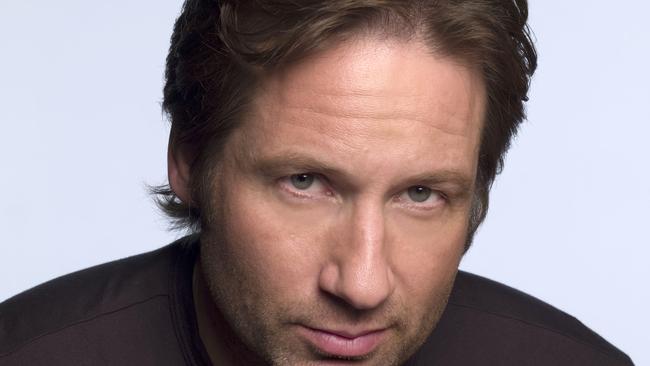David Duchovny: Holy Cow an amusing satire on human failings
HOLY Cow is often snort-out-loud funny. David Duchovny dispenses puns and excuses implausibilities with charm.

FOR seven seasons, David Duchovny played a bantery, whisky-sodden writer, Hank Moody, on American television series Californication. It seems fitting, then, to have the actor’s first novel a matter of months after Californication’s finale.
Holy Cow is a wry, jocular animal fable with satire underneath. Elsie, the titular bovine, lives happily in a field with her “bff” Mallory, enjoying life, chewing cud, getting milked. When they escape from their paddock to join the bulls, Mallory finds their machismo enchanting: “... the bulls were like, ‘Hey there, baby girl … You want me to knock down this fence, little lady, ’cause I totally will, I will knock this shit down’.”
But Elsie is drawn towards the farmhouse, where “lights were glowing … a flickering light, like a campfire”. On TV (the “Box God”) she learns what really happens to animals who leave the farm: “Murdered … hung up on big metal hooks and cut up, stripped of skin and dismembered … blood everywhere, all I remember is blood.” Elsie, understandably, “emptied the contents of all four of my stomachs. And then I passed out.”
Inspired by India, where cows are worshipped rather than barbecued, Elsie decides to escape by plane: “I turned the word over and over: India. India. Like a jewel you might turn over in your pocket.” To do so, she conspires with Shalom the pig, a “nervous pooper” who was originally Jerry but converted to Judaism to avoid being eaten. Later, they team up with Tom, a turkey who “walked with the confident strut of a pimp from a ’70s Blaxploitation movie” to mask his torment at being unable to fly. Shalom is destined for Israel — he figures there’s less chance of being turned into bacon — and the turkey is keen on, well, Turkey.
On their journey to the airport, our heroes defeat a wolf (“Boo-ya!”), get assaulted by “a-hole” rat drug dealers, and trick an oversexed airport sniffer dog who wants to make Shalom his “bee-yotch” (“Did you just call me a bitch, Rin Tin Tin?”).
It isn’t easy for a cow, a pig and a turkey to board a commercial airliner. But Elsie gets on her hind legs “in a beige raincoat and sunglasses, and Shalom [is] dressed in the velvet pants of a little schoolboy, holding our pet turkey by the leash. We had the foresight to register Tom as a comfort turkey, an emotional support fowl.” Tom embraces the role, adopting a German accent and dispensing Freudian analyses.
Travel becomes more convenient when Tom discovers an innate ability to fly an aircraft, if not himself. Later, on a stolen private plane, the animals journey from Turkey to Israel and Palestine, and then to India, accidentally bringing peace to the Middle East along the way.
Holy Cow is often snort-out-loud funny. Duchovny writes with tongue firmly in cheek, dispensing puns and excusing implausibilities with charm. Some of the best parts are Elsie’s meta-commentary on writing in Hollywood, particularly the interjections of her editor: “ ‘Sugar, there’s no way Hollywood will make a movie about a Jewish pig in Israel being stoned by Muslims. Too many hot buttons. Too niche. Too indie. We have to think tent pole. Not Sony Classics. Can’t the pig go to New York, you know, and meet a girl? Kind of like Babe meets My Big Fat Greek Wedding?’ ”
Beneath the amusing fable is a satire on human failings. Elsie’s farm life critiques our ill-treatment of animals and wastefulness of food. The journey between Israel and Palestine — where former cigarette model Joe Camel convinces Jews and Muslims to unite based on their mutual hatred of Shalom — mocks religious geopolitics. And organised religion is politely rubbished in India, where Elsie is rejected by other cow “goddesses” because she won’t renounce her animal nature (imagine Mean Girls with cows and you get close).
Although seemingly Swiftian in intent — with the Gulliver’s Travels device of fantastical journeys that illuminate real failings — the satire here is undercut by its light, jokey tone. But that yields good things such as a pig and a turkey getting high on magic mushrooms: “ ‘Blellow. Blellow. Blellow,’ Shalom slurred. ‘Blue and yellow together, that’s a colour we need a name for. Coining it.’ ”
The strength of Holy Cow is Duchovny’s unpretentious comic voice, which sounds a lot like Hank Moody’s (or, rather, the novel shows how much of Duchovny went into Hank’s dialogue). He writes extremely well. A distinguished actor, perhaps still best known for The X Files, Duchovny also has screenwriting credits in TV and film, and degrees in English from Princeton and Yale. Those literary chops come through in the spark and glimmer of his wit and intertextual references.
His learning is worn lightly and with humour. After bringing up the Iliad and Odyssey (via Elsie), Duchovny writes, “Sorry for the name-dropping. Homer. Boom.” Some literary novelists would do well to mark that approach.
James McNamara is a Sydney writer.
Holy Cow
By David Duchovny
Hachette, 144pp, $24.99 (HB)


